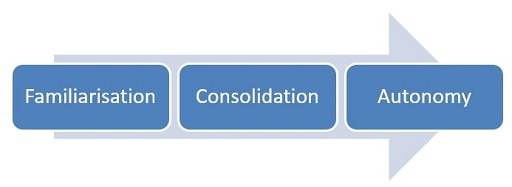1 Growing with your mentee – mentoring as a continuum
A beginner teacher must first familiarise themselves with what is expected of them, the routines within school and how classes are organised and taught. A period of consolidation follows as the beginner teacher works to understand more clearly their role in school, and gradually they move towards autonomy, taking on the role and responsibilities of a teacher.
Beginner teachers’ progress as they enter and proceed through their practice learning can be conceptualised as:
Reflection point
- How does the role of a mentor change as the beginner teacher progresses through this continuum?
Effective mentoring at all stages of the beginner teacher’s progress requires a mixture of support and challenge. Good mentors recognise when to support and when to challenge. According to Daloz (1989), mentor support affirms a beginner teacher's experiences and builds trust, whereas challenge requires trust in the beginner teacher. Offering challenge sometimes means that contradictory ideas are introduced and tacit assumptions are questioned. Some tension may develop, but this can support the development of agency in the beginner teacher. Daloz (1989) argues that any interchange between a mentor and a mentee can and indeed should involve both challenge and support, and that what may be perceived as support by one beginner teacher could be viewed as challenge by another. He presents Figure 2 to suggest that growth occurs when both high challenge and high support are given.
Activity 1 Support or challenge?
Consider each scenario and note how you might offer support or challenge.
| Scenario | Support | Challenge |
| A beginner teacher beginning first placement offers to teach all the lessons for a particular class/subject because he/she wants to become fully involved from the start. | ||
| A beginner teacher lacks confidence in teaching a particular class/subject. | ||
| A beginner teacher reprimands a learner with additional learning needs for not trying hard enough, leading to a loss of confidence in the learner and a complaint from the parent. | ||
| A beginner teacher wants to try a new set of resources that he/she has discovered, but you feel they may be problematic with a particular class. |
Challenging and supporting the beginner teacher you mentor will help them to grow; at the same time, your skills and capabilities as a mentor must grow. This is discussed next.


